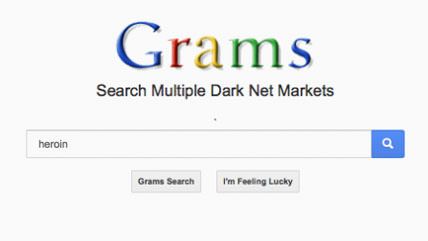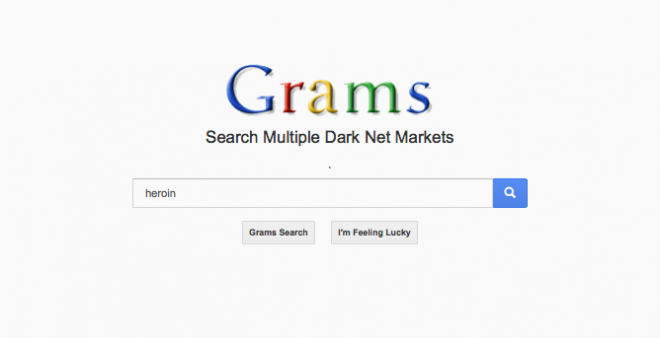The Internet Black Market Just Got Its Own Google


To find oneself an unmarked automatic weapon required either knowing exact addresses on the deep web or a prominent California Democrat. One of those options recently got a lot harder (sorry, Leland Yee) but the other may be on the verge of getting easier. For black market goods most people turn to hard-to-access places on the Internet, which haven't been conducive to browsing. Last week, an anonymous individual launched a search engine called Grams that caters to all kinds of contraband needs.
Known only as "Gramsadmin," the engine's creator explained to Wired, "I noticed on the forums and reddit people were constantly asking 'where to get product X?' and 'which market had product X?' or 'who had the best product X and was reliable and not a scam?' I wanted to make it easy for people to find things they wanted on the darknet and figure out who was a trustworthy vendor."
So, he spent two weeks building Grams, which looks a lot like Google, primary color scheme and "feeling lucky" button included. He built it to function like Google, too. Gramsadmin has discussed his project on Reddit:
I am working on the algorithm so it is a lot like Google's it will have a scoring system based how long the listing has been up, how many transactions, how many good reviews. That way you will see the best listing first….
Within the next two weeks Grams will have a system similar to Google AdWords where vendors can buy keywords and their listings will go to the top of the search results when those keywords are searched for…. They will be bordered with an advertisement disclaimer so users know those are paid results.
Although it's only a beta version and only accessible through the Tor Browser, which facilitates anonymous Internet activity at a tedious pace, Grams has an average time of one second for a search to load, which is "super fast, especially for Tor," Vice's Meghan Neal reports.
Also, Grams currently only shows results from eight different marketplaces, such as SilkRoad2, Agora, and BlackBank.
For those who want to give it a whirl, "grams7enufi7jmdl.onion" is the address.
Editor's Note: As of February 29, 2024, commenting privileges on reason.com posts are limited to Reason Plus subscribers. Past commenters are grandfathered in for a temporary period. Subscribe here to preserve your ability to comment. Your Reason Plus subscription also gives you an ad-free version of reason.com, along with full access to the digital edition and archives of Reason magazine. We request that comments be civil and on-topic. We do not moderate or assume any responsibility for comments, which are owned by the readers who post them. Comments do not represent the views of reason.com or Reason Foundation. We reserve the right to delete any comment and ban commenters for any reason at any time. Comments may only be edited within 5 minutes of posting. Report abuses.
Please to post comments


Speaking of the internet, HHS pays $146.64 per month per user for email, for a total of $123.2 million per year for 70,000 employees.
HHS told us that HHS pays $146.64 per month per user for email; that this charge covers connectivity, storage, and other e-mail services; and that this charge is independent of the number of emails that are sent or received," the GAO said.
The government likely has a much higher requirement for security and storage than the mid-cap firm I work for and I know for a fact that they use a lot more bandwidth than we do, but it still seems a bit high.
I wonder how much of this is lazy accounting. If I take the total costs of the major portions of my company's e-mail environment, except connectivity, and spread it over 60 months, it's about $2.50 per user per month, but if I add our network costs it shoots up to about $33.00. I could also push it up higher by including the cost of mobile devices, remote connectivity, devices, repair, professional services, hosting, etc. There's a lot in there that an auditor could call "e-mail" just because they don't know any better or can't be bothered to separate the portion that is actually e-mail related from the total overall purchases.
I would assume that since they split out "email services," they don't mean "all IT services."
You would think, but lumping in connectivity with e-mail services doesn't bode well to me. There's a lot of stuff that is ancillary or unrelated to e-mail that can fall into the same bucket if that's how you choose to organize it.
I have no doubt that there's a colossal waste of money going on somewhere, but I have difficulty believing that number at face value. Why should I assume the GAO knows what they're doing when the rest of FedGov has proven to be so inept?
Is this legit? Or is it a TARP?
Its a tarp!
/Housepainter Ackbar
It's a rap!
- A-Dog Ackbar
I sense a cease and desist order on use of trademarked logos and likeness, coming forthwith.
Hmm, I punch in that URL and google treats it as a search.
Does this mean I can't have grams and Reasonable in the same browser? Boo.
It's a TOR URL. Install the TOR browser.
Head ---- desk
It's useless. All the results are to "referred registrations only" sites.
First thing I did was search for Cheese Pizza to see if it is censored. It is.
Try this. It's a list of crawled hidden services sites.
http://skunksworkedp2cg.onion/
Isn't part of the point of having an underground website that you DON'T want people to find you easily?
I should think that having the URL only findable via word of mouth would make things more secure for the vendors and sellers alike.
Why would you want to advertise your presence to the entire world?
Not necessarily. The point is to be untraceable. See: TOR network
This is so frustrating. I was hoping to get my hands on my very own Death Star, but the damn URL won't work!